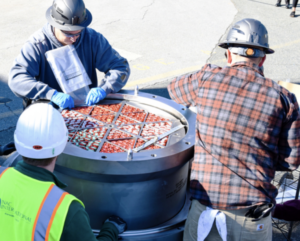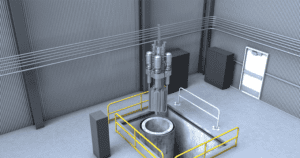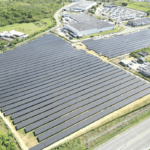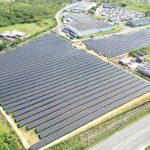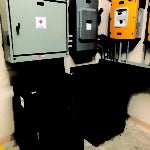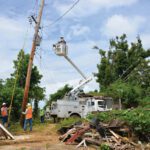San Juan, PR (March 22, 2021) – The village of Castañer, Puerto Rico has been selected to receive support for a solar energy microgrid project, as part of an initiative led by The Solar Foundation and Pathstone Corp. to strengthen and expand the solar industry in Puerto Rico and build more resilient communities.
The microgrid project will include a solar energy and battery storage installation for small businesses that provide essential goods and services for the people of Castañer. They will benefit from a clean, low-cost source of electricity that will also provide some backup power in the event of future interruptions to the power grid. The community will develop the project in collaboration with The Solar Foundation and the Microgrid Laboratory at the University of Puerto Rico in Mayagüez (UPR-M).
The development of this project will be supported by the Puerto Rican Solar Business Accelerator (PRSBA), which is funded by a grant from the U.S. Economic Development Administration. Led by Pathstone Corp. and The Solar Foundation, the PRSBA is helping transform Puerto Rico’s energy system through solar workforce development, expanded finance options, and technical assistance to solar businesses, along with two solar energy microgrid projects.
Castañer was chosen from a total of nine candidates following a rigorous selection process. A rural, mountainous community located between the municipalities of Lares, Adjuntas, Maricao, and Yauco, Castañer has a successful track record of community-centered projects. After Hurricane Maria made landfall in 2017, the community was without electricity for six months, negatively impacting all aspects of the daily life of its inhabitants.
“We are very excited to work with Castañer on this cutting-edge project that supports the use of clean, renewable energy, while enhancing the community’s resilience to future grid interruptions,” said Carlos Alberto Velázquez, Program Director for The Solar Foundation in Puerto Rico. “From an educational and professional development perspective, Puerto Rico’s engineering students will have a great opportunity to be front and center in the development of new technological solutions that have an important social and environmental component.”
“At Pathstone, we’re excited to contribute to economic development in remote and vulnerable communities. We are proud of the alliance that we’ve achieved with diverse organizations to initiate the construction of a microgrid in Castañer and provide the opportunity for about 120 people to enter the solar workforce through our training and employment programs at Pathstone,” said Rosa Uriarte, deputy director of Pathstone Enterprise Center.
The Solar Foundation and UPR-M will provide direct support to Castañer in all phases of the project, including the presentation of sustainable financing options, drafting of the Request for Proposal, project design, and project management. The Solar Foundation will also be donating solar equipment with an approximate value of $40,000 which will reduce the overall cost of the project.
The community of Castañer has been joined in this project by the Hydroelectric Cooperative of La Montaña (CHM), a nonprofit entity that seeks to reduce vulnerability to natural disasters and the time required to restore electricity for the populations of Utuado, Adjuntas, and Jayuya. CHM has been selected by Castañer as the community representative in the microgrid pre-development and development stage.
“This project addresses a long-standing problem in Castañer,” said José A. Vélez, a local business owner. “It is a good initiative, mainly because it begins with merchants, who along with the school and hospital are at the heart of the community. Local businesses generate employment for the inhabitants of Castañer, and they joined the rest of the community to help with the recovery after the emergencies we experienced in recent years.”
The community microgrid project is expected to contribute to Castañer’s energy resilience by integrating local businesses that have provided essential services during emergencies such as hurricanes and earthquakes. It is also expected to serve as an example for other communities wishing to develop projects such as this one. The current plans are to be in the installation and construction phase of the microgrid by the fall of 2021.
In the coming weeks, The Solar Foundation will be announcing a round of applications for the second microgrid project supported by the PRSBA. Communities interested in participating in the selection process can complete the form at the following link: https://comunidadsolarpr.org/solicitud-de-orientacion-sobre-proyecto-piloto-de-microrred. A webinar with more information for communities will be offered on March 30. To register, visithttps://register.gotowebinar.com/register/5218531088397911565.

